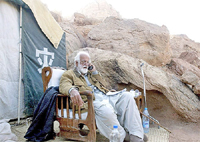Thousands mourn the tribal chief's death in Pakistan
Thousands observed a large-scale strike and lawmakers condemned Pakistan's government on Monday over the weekend killing of one of the country's most prominent tribal chiefs in a military raid.

Saturday's killing of Nawab Akbar Bugti, 79, sparked two days of rioting in southwestern Baluchistan province, particularly the capital Quetta, that at left as least two people dead and a dozen wounded. Police made at least 450 arrests Sunday, AP reports.
In contrast, Quetta's streets were virtually empty Monday as shops, markets and offices shut and public transport ground to a halt in line with a strike called for by pro-Bugti political groups.
Opposition ethnic-Baluch lawmakers denounced the government in a rowdy provincial assembly session and vowed to avenge the killing of Bugti, arguably the most prominent ethnic-Baluch leader since Pakistan's 1947 founding.
"This is a major event in Baluch history. We didn't join this country in 1947 to have our tribal elders, political leaders and children killed," said opposition leader Kachkul Ali Baluch.
Bugti, an articulate champion of greater rights for ethnic Baluch tribespeople, died after troops attacked his cave in the Kohlu area, about 220 kilometers (140 miles) east of Quetta, officials said. The cave's roof collapsed, killing Bugti and several of his fighters.
Pakistani authorities have not yet returned Bugti's body to his family, the late leader's son, Talal, said. However, a funeral ceremony has been scheduled for Tuesday in a Quetta sports stadium, he said.
U.S.-based Human Rights Watch demanded an investigation be held into the raid that led to Bugti's death amid "allegations of the use of disproportionate force."
Baluchistan police chief Chaudhry Mohammed Yaqoob said one Bugti supporter and one policemen were shot dead in separate incidents during Quetta's large-scale rioting Sunday. At least a dozen others, including nine policemen engaged in a gunbattle with Bugti supporters, were hurt.
Bugti's political supporters called for Monday's strike and ordered a 15-day mourning period. Government officials have tried to restore calm in the fiercely independent province and urged dialogue to resolve the region's grievances.
"Nawab Akbar Bugti was a towering political personality of the province," said Abdul Rahim Kakar, head of the traders association in Quetta, a city of about 300,000 people. "We have decided to close shops to support this (strike) appeal."
Baluchistan, bordering Afghanistan and Iran, has seen decades of conflict as tribespeople led by Bugti pressed for a bigger share of wealth from the province's gas, oil and other resources.
Subscribe to Pravda.Ru Telegram channel, Facebook, RSS!


